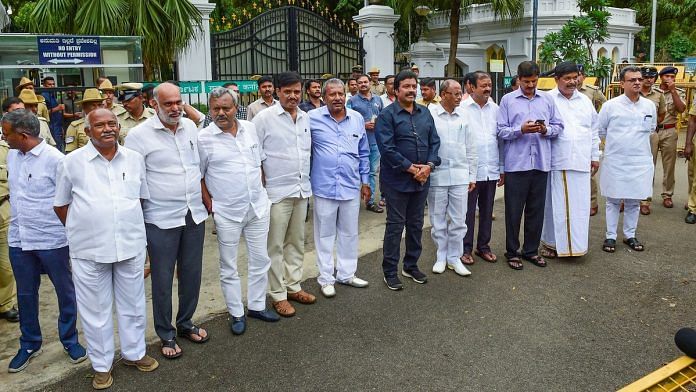Last week, Karnataka Chief Minister H.D. Kumaraswamy was on a private visit to the United States. In his absence, rebel MLAs from his Janata Dal (Secular) and coalition partner Congress mounted a political coup. But Kumaraswamy is not the only chief minister to have faced a rebellion while abroad. In 1984, then Andhra Pradesh Chief Minister N.T. Rama Rao was undergoing a heart surgery in the US. In his absence, one of his cabinet ministers, N. Bhaskara Rao, got his government dismissed. More recently, in 2012, one of Odisha Chief Minister Naveen Patnaik’s trusted advisers, late Pyarimohan Mohapatra, had tried to wrest control while the CM was on an official visit to London. While Rao was able to return to power after a month, Patnaik did not lose control of his party MLAs.
JD(S)’ Kumaraswamy, however, may not be able to achieve a similar result. His coalition government does not seem to have the numbers to survive a no-confidence motion, which is likely to be moved on the first day of the monsoon session of the 225-member Karnataka assembly on 12 July. Against the majority mark of 113, the Congress-JD(S) coalition had a combined strength of 120 MLAs – Congress’ 80, JD(S)’ 37, Bahujan Samaj Party’s one and two Independents.
Latest media reports say that as many as 16 MLAs have submitted their resignation to the Speaker. If accepted, it will reduce the House strength to 209 and bring down the majority mark to 105. The Bhartiya Janata Party (BJP) has 105 MLAs in the House.
Also read: 3 key takeaways from Karnataka crisis no matter what happens to Kumaraswamy govt
Damage control is in full swing in Bengaluru. The entire cabinet has resigned to make way for other MLAs to become ministers in the government. Former Congress Chief Minister Siddaramaiah has threatened disqualification proceedings against the rebel Congress MLAs. The office of the Speaker has indicated that the resignation letters of some of the MLAs are not in order and may not be accepted. But the rebel legislators have stood their ground on resignation, and are currently holed up in Mumbai.
A remedy that achieved little
The events in Karnataka are not new. Individual and group of legislators have been able to destabilise governments regularly over the years. The usual method of opposition parties has been to lure away ruling party/coalition legislators. This floor-crossing in states reached epic proportion in the 1960s and 1970s. MLAs in some states changed their political allegiances multiple times during the day.
Parliament amended the Constitution in 1985 in an attempt to stop this menace, with the deterrent being the MLA’s loss of House membership. However, the deterrence has had little effect. Political parties and MLAs have over the years continued to bypass and exploit this constitutional amendment, referred to as the anti-defection law.
Also read: Should Karnataka hold fresh elections or continue to bank on unnatural political alliances?
The only thing this law has been good at is in defining the rules that need to be met or bypassed for creating political uncertainty. Political parties now hide behind this law to cajole and convince MLAs to serve their purpose. The events in Karnataka (as well as in Goa) are among the many wake-up calls about the uselessness of the anti-defection law.
Law and its fundamental flaw
The anti-defection law has been in place for over three decades now. But the penalty of loss of membership of the legislature has never deterred MLAs from switching political parties. In the current situation in Karnataka, MLAs have preempted the punishment under the law by resigning themselves. The problem with the anti-defection law is not that the penalty for changing political party is not stringent enough; the fundamental flaw is that the entire idea of anti-defection tries to solve a political issue through a legal solution.
Also read: Speaker Ramesh Kumar holds the cards in Karnataka political crisis, for now
Anti-defection is the only law in the country that has consistently failed every time it has been invoked to secure political stability. In addition to being ineffective and redundant, the anti-defection law has destroyed the deliberative nature of our democracy. The threat of expulsion is used to ward off any intra-party dialogue or debate in the assembly. Since the law gives the Speakers the power to expel MLAs, their office’s neutrality too has been systematically destroyed, so much so that Speakers have delayed acting on expulsion for years.
If we want our lawmaking institutions to function as per their constitutional mandate, it is high time that the anti-defection law is repealed in its entirety.
The author is the Head of legislative and civic engagement, PRS Legislative Research. Views are personal.




Anti-defection law isn’t a perfect remedy to all forms of political instability. It has worked exceedingly well in allowing even unstable and disparate govts to function for far longer. It doesn’t protect against large group of legislators changing parties, but that raises the bar for instability. This is how the law was intended to work. It is easy o blame the law every time politicians find a way to circumvent it but that ignores the reality is that the law makes defection a lot harder. To say that the law has failed every time simply ignores the number of times the law worked and forced legislators to stay within the party.
Nice comment
Each legislator should now be regarded as potentially a negotiable instrument, a quasi sovereign republic that goes to the highest bidder. A billion for an MLA shows how rich India has become. There is only so much the Speaker or even the court’s can do. And this is assuming that forces more powerful than pure economic inducement are not in play.